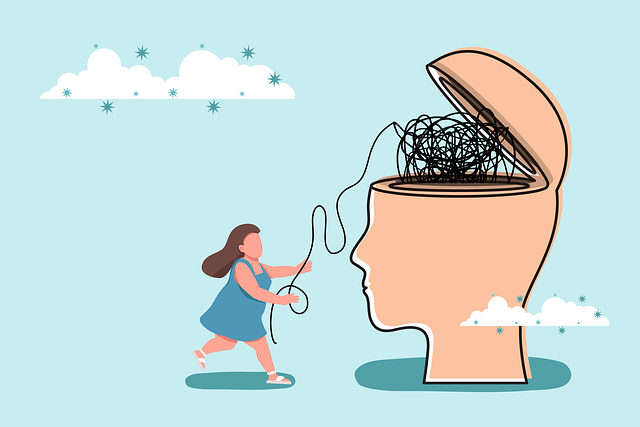Englewood Couples Communication Issues Therapy leverages positive thinking exercises to transform relationships by fostering optimism, empathy, open communication, and resilience. Incorporating mental health awareness, cultural sensitivity, and empathy-building strategies, this tailored approach strengthens bonds, reduces conflicts, and cultivates lasting positive relationships, empowering couples to view challenges as opportunities for growth.
Positive thinking exercises have emerged as a powerful tool in therapy, offering profound benefits for mental well-being and interpersonal relationships. This article explores the transformative impact of positive thinking on individuals and couples, with a specific focus on Englewood couples facing communication issues. We delve into practical strategies for therapists to integrate these exercises into treatment, showcasing their effectiveness in fostering healthier connections. By understanding the science behind positive thinking, professionals can guide clients toward more fulfilling lives.
- Understanding the Impact of Positive Thinking on Relationships
- Strategies for Implementing Positive Thinking Exercises in Therapy
- Real-Life Applications: Using Positive Thinking to Overcome Communication Issues in Englewood Couples
Understanding the Impact of Positive Thinking on Relationships

Positive thinking exercises have a profound impact on relationships, especially in the context of Englewood Couples Communication Issues Therapy. By fostering a more optimistic outlook, partners can improve their understanding and empathy for each other. This shift in perspective encourages open communication, where feelings and concerns are shared without fear of judgment, leading to stronger bonds. The practice helps individuals recognize and appreciate the positive aspects of their relationships, reducing conflicts and promoting a healthier dynamic.
Incorporating mental health awareness and cultural sensitivity in mental healthcare practice is essential for effective relationship therapy. Empathy building strategies play a crucial role here. Through exercises that enhance emotional intelligence, couples can navigate challenges with greater compassion, ensuring each person’s unique experiences and perspectives are respected. This tailored approach not only addresses immediate communication issues but also contributes to long-lasting positive relationships.
Strategies for Implementing Positive Thinking Exercises in Therapy

Implementing positive thinking exercises in therapy can be a powerful tool for addressing communication issues within couples. At Englewood Couples Communication Issues Therapy, we find that integrating optimistic strategies into traditional treatment methods can significantly enhance client progress. One effective approach is to encourage clients to practice gratitude journaling, where they reflect on and write down three positive aspects of their day, fostering a shift towards appreciation over adversity.
Additionally, mindfulness techniques such as meditation and deep breathing exercises allow individuals to stay present, reducing the impact of negative thoughts. These practices not only improve overall well-being but also serve as valuable self-care practices (a key aspect in depression prevention). By incorporating resilience-building activities, therapists can empower couples to view challenges as opportunities for growth, strengthening their ability to navigate life’s ups and downs with greater ease.
Real-Life Applications: Using Positive Thinking to Overcome Communication Issues in Englewood Couples

Englewood couples facing communication issues can find a powerful tool in positive thinking exercises. By fostering open and honest dialogue, these practices encourage partners to view each other’s perspectives, enhancing understanding and connection. Therapy sessions often incorporate techniques like reframing negative thoughts into more constructive ones, boosting self-esteem and confidence for both individuals. This shift in mindset can significantly impact the emotional healing processes within the couple, leading to stronger bonds and improved relationships.
Through consistent practice, Englewood couples can learn to navigate conflicts with greater ease, ensuring that differences in opinion become opportunities for growth rather than barriers to intimacy. Positive thinking exercises not only help in overcoming communication challenges but also promote a healthier, more fulfilling partnership in the long term.
Positive thinking exercises, when integrated into therapy, offer a powerful tool for improving relationships, particularly for Englewood Couples facing communication issues. By focusing on optimism and reframing negative thoughts, individuals can enhance their emotional well-being and strengthen bonds. The case study highlighting Englewood Couples demonstrates the effectiveness of these strategies in real-world scenarios, showcasing improved communication and deeper connections. This approach not only benefits couples but also has broader implications for personal growth and relationship therapy.














